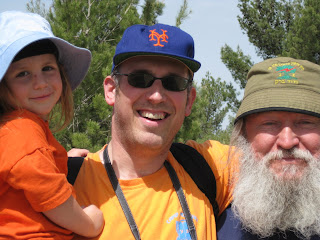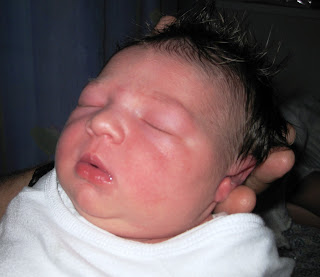Prior to 2008, I was always a little wistful on Israel's Independence Day. Not much was said, if anything, in most of Baltimore's shuls and schools. There were no special prayers to thank Hashem for giving us the miracle of the State of Israel. I listened to all of the explanations about why we didn't celebrate this gift. But I remained dissatisfied, and a little sad. I sought out those who, like myself, longed to be in the Land; and we sang songs of praise to the only One who made a Home for the Jewish Nation a possibility.
On Yom Ha'atzma'ut in 2008, I was thrilled to be living in Israel at last. Still somewhat confused by what one was permitted to say and not to say in the prayers on this auspicious date, I tentatively said Hallel -- without a blessing.
This morning, I happily followed the Torah of Rav Shlomo Aviner, and said Hallel with a blessing. And as I said these words of praise, reserved for very special days on the Jewish calendar, my heart heard anew the words "This is Hashem's doing. It is wondrous in our eyes."
It suddenly occurred to me as surprising and sad that the holy congregations of the Diaspora, steeped in the teaching that only Hashem makes miracles, would not defiantly remind themselves and the world that modern Israel could not have happened without His direction. It was not the Israeli army, for all its courage, that created the State of Israel. Nor was it Herzl or Ben Gurion or the United Nations. Not by my might, nor by the strength of my hand...
It seems to me that it is a very frum concept indeed to thank The Only One who could have made such a miracle.
The Dearly Beloved reminds me of the great story of Napoleon, hearing the heart-rending cries of Jews coming from a synagogue. When he asks over what they are weeping and wailing, he is told that they are crying over the destruction of their holy Temple. He wonders how anyone could destroy the Temple of this poor people during his reign without his awareness... and he is informed that the Jews are crying over a loss that had occurred more than a thousand years ago. And he praises this people, saying that a nation that feels the pain of the loss of their holy Temple so acutely so many years after the fact will surely merit to see it rebuilt. This is a great story. At Tisha b'Av, it gives me a great deal of chizuk. But today it brings to my husband's mind a different thought.
"When we were in Chutz l'Aretz, we were very good at mourning for our loss. But we were not so good at celebrating the beginning of our Redemption."
The Dearly Beloved recently bought for me the new Koren Siddur, which replaces my beloved Artscroll. I feel a need to say farewell.
Dear Artscroll Siddur,
 Please don't be hurt or offended. You were my friend as I tried to learn how to be a Jew. You told me when to bow, and when to say the right words in the spring and in the winter. You have been a good friend; and I will always love you. But now I am here in Israel. And the kohanim bless us every day! And there are words I can say here, that are different than the words I said in America... and they really matter to me. Koren is the best teacher for me now. I will always have a special place for you in my heart -- but it's time to move on. I hope you will understand...
Please don't be hurt or offended. You were my friend as I tried to learn how to be a Jew. You told me when to bow, and when to say the right words in the spring and in the winter. You have been a good friend; and I will always love you. But now I am here in Israel. And the kohanim bless us every day! And there are words I can say here, that are different than the words I said in America... and they really matter to me. Koren is the best teacher for me now. I will always have a special place for you in my heart -- but it's time to move on. I hope you will understand... There is more to process. But now I must follow my husband, Avraham, who says: "What is the best way to celebrate the gift of the return to Israel, and the gift of the return of Israel to us? It's time to walk the land."
If you want to see a really GREAT photo of the new little Eastman sabra, check out Through Josh-Colored Glasses, and read her abba's love letter to her. (As usual, have a box of tissues handy.) Stay tuned to hear what is her name. I won't know until after Shabbat...
























5kzMV9Q~~_12.JPG)
5kzMV9Q~~_1.JPG)






























